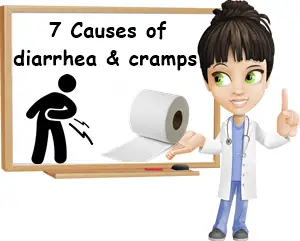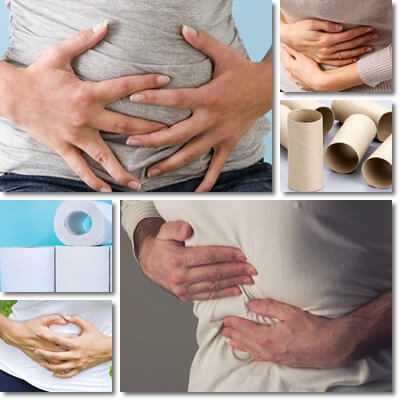Diarrhea and cramps in adults is so common that it’s often not a reason for serious concern. For the most part, people know it’ll pass and they know what to do about it.
Of the host of possible causes, irritant foods such as coffee, fermented foods such as sauerkraut, cold foods and beverages such as ice cream or plain cold ice water or food allergens such as sulfites in dried fruits and some dried herbs, spices and condiments are common culprits. Here are 7 common causes of diarrhea and cramps to consider next time you’re faced with the issue to help you better prepare for the future.
1) Eating or drinking something cold
It is fairly common to experience diarrhea with cramps after eating and especially after drinking something cold. Cold beverages in particular are more likely to trigger diarrhea because it’s simply easier to consume a lot in a short span of time.
For some, even a glass of cold water or iced water can cause them to rush to the bathroom. For others, it’s specific beverages such as cold milk, cold soda or cold beer that cause diarrhea and associated cramps. As for foods, eating cold watermelon or even a little more ice cream than you would normally eat can have the same effect.

2) Certain food and beverage combinations
Some people are just more sensitive to what they eat, without this necessarily being a case of food intolerance or sensitivities, allergies or an underlying condition. Certain food and beverage combinations in particular are more likely to trigger diarrhea and associated cramps.
For example, drinking soda with milk, eating yogurt and drinking coffee, drinking water with fruits (especially fruits with skin such as apples and unripe, green fruits) and many more combinations of the likes can cause diarrhea and cramps.
3) Certain foods
Certain classes of foods are more likely to cause diarrhea and associated cramps. For example, irritant foods and beverages such as those containing caffeine: coffee, green tea, black tea, caffeinated tea or other beverages, coffee-based sweets etc. Or fats such as lard or baked goods or foods made with it can rush someone to the bathroom in a few hours, causing loose stools and diarrhea with cramps.
Probiotics such as sauerkraut (pickled cabbage), buttermilk, soured milk can have the same gastrointestinal side effects. And so can high-fiber foods such as beans, peas, chickpeas or lentils.
4) Food intolerance
Some people tend to experience loose stools and diarrhea with cramps after eating certain foods. When the same foods cause this type of gastrointestinal symptoms again and again, it’s a case of food intolerance or sensitivity.
Common foods such as pumpkin, French fries or even baked potatoes, unripe, green fruits (which are higher in indigestible fibers), fermented grape juice, eggplant, soured foods (soured milk, buttermilk, kefir, sana), eggs, foods with gluten (wheat, rye, barley, oat), lactose-containing foods (milk, cheese, other byproducts), onions, leek, garlic etc. can lead to diarrhea and cramps after consumption. It’s important to identify the foods you are sensitive to or intolerant of and either limit intake or exclude them from your diet completely to improve your digestive health.

5) Food allergies
A food allergy is a more serious case of food intolerance and can build up to anaphylactic shock which is a medical emergency. Food allergies are typically caused by proteins in various foods which elicit an exaggerated immune system response that can lead to fatality if left untreated (appropriate treatment must be administered as soon as possible). Symptoms such as a skin rash, itching, red bumps on the skin, swelling of the lips, tongue or throat, coughing, wheezing or difficulty breathing, but also nausea, vomiting sensation, stomach upset, loose stools or diarrhea and cramps are all signs of an allergic reaction.
Common food allergens include:
- Eggs (more common: egg white and all types of whole eggs)
- Peanuts and other nuts, including pine nuts, almonds, cashews, macadamia nuts etc.
- Sesame seeds of all colors and, to a lesser extent, other seeds, and their oils
- Dairy milk (cow, but also water buffalo, sheep and goat)
- Soy (one of the most common allergens worldwide)
- Wheat (primary source of the allergy is the protein known as gluten)
- Rice (a less prevalent allergy than wheat, but still prevalent)
- Seafood, including shellfish, crustaceans and some fish (e.g shrimp, oysters, clams, crayfish etc.)
- Sulfites (naturally present in wine and tea, but also dried fruits, dried coconut and some spices, dried herbs and condiments for which sulfites are used as preservatives)
6) Infectious causes
Gastroenteritis is a disease that causes the inflammation of the mucous membranes of the gastrointestinal tract. It can be viral, bacterial, parasitic or, more rarely, fungal in nature, and typically causes diarrhea with cramps. Viral gastroenteritis tends to resolve itself, but other types require appropriate treatment. Care should be taken to address dehydration and other symptoms. Find out more about gastroenteritis, or the stomach flu.
7) That time of the month
For women, one of the most common causes of diarrhea and cramps is menses. It is common during the first day, first and second and sometimes also third day to experience loose stools and even diarrhea along with painful cramps. The cramps experienced can be either uterine contractions or regular diarrhea cramps, and can be hard to tell apart from one another. More likely than not, it’s the uterine contractions that stimulate peristalsis and the sometimes premature evacuation of bowel movements, resulting in loose stools and diarrhea. But it’s also possible to experience diarrhea-associated cramps triggered by the urgency to have a bowel movement which is, in turn, triggered by uterine contractions. Taking anti-inflammatory medication such as ibuprofen as soon as the cramps start is a great way to prevent or ease pain and other symptoms by inhibiting the production of prostaglandins. Nausea and diarrhea during period, but also vomiting and fatigue and even headaches and migraines are quite common occurrences.
When to worry
Looking to understand what your normal is and what may be out of the ordinary for you is a great way to help yourself be healthy and notice potential issues early on. And while sometimes the signs of an underlying issue may be subtle, here are some important symptoms to look out for:
- Diarrhea all the time. If you are experiencing diarrhea more frequently than normal bowel movements, it may be a good idea to have it checked out by your doctor. Normal bowel movements should be solid, but soft and smooth, and well-formed. Experiencing loose stools or diarrhea, cramps, flatulence and bloating all the time may indicate a hidden condition such as IBS, Crohn’s disease, colitis etc.
- Diarrhea and blood. Blood in the stool can appear as bright pink, bright red, but also maroon or black, depending on where it comes from in the gastrointestinal tract. Any color that is not a medium dark brown and occurs repeatedly, but cannot be traced back to something you ate in the past day or two, should be investigated by a doctor. See what stool colors mean.
- Diarrhea and fever. If you notice a low-grade or even high-grade fever with diarrhea, consider an infectious cause and see your doctor for some tests and treatment as soon as possible. Other causes include underlying inflammatory conditions such as Crohn’s disease.
- Diarrhea and chills, or chills alternating with fever. Fever and fever alternating with chills are typically signs of infection. If you notice these symptoms and experience diarrhea and cramps, see your doctor.
- Diarrhea and fatigue. Really watery and frequent stools (say, a couple more bowel movements a day than normal for you, occurring over the course of several days) can be associated with a sense of tiredness, malaise, weakness and apathy. Often times, the fatigue is caused by dehydration so make sure you replenish lost fluids and electrolytes with the help of naturally sparkling water or mineral water, sports drinks (e.g. Gatorade), electrolyte solutions, but also some tea or fruit juice in which you can dissolve electrolyte solutions for rehydration.
- Diarrhea and vomiting. If you find yourself unable to eat or drink or to keep food and fluids down, it’s a good idea to see your doctor for treatment as soon as possible.
- Significant weight loss. Whenever you observe significant weight loss you cannot trace back to lifestyle and dietary changes, it’s good to have the issue checked out by your doctor. Causes range from malabsorption problems to underlying conditions such as Chron’s disease and more.
